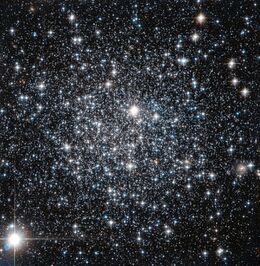IC 4499
Topic: Astronomy
 From HandWiki - Reading time: 3 min
From HandWiki - Reading time: 3 min
Short description: Globular cluster in the constellation Apus
| IC 4499 | |
|---|---|
 IC 4499, as seen through the Hubble Space Telescope | |
| Observation data (J2000 epoch) | |
| Class | XI[1] |
| Constellation | Apus |
| Right ascension | 15h 00m 18.57s[2] |
| Declination | −82° 12′ 49.6″[2] |
| Distance | 50,000 ly (15,000 pc)[1] |
| Apparent magnitude (V) | 9.76[3] |
| Apparent dimensions (V) | 7.6′ × 7.6′[1] |
| Physical characteristics | |
| Metallicity | = −1.53[3] dex |
| Other designations | GCl 30, Melotte 129[2] |
IC 4499 is a loose globular cluster in the constellation Apus. It is located in the medium-far galactic halo.[4] Its apparent magnitude is 9.76,[1] and was thought to be unusual because it appears to be 3–4 billion years younger than most other globular clusters in the Milky Way, as determined by metallicity measurements in 1995.[4] However, this was contradicted in 2011 by results that yielded a much older age of 12 billion years.[5]
As typical for very old globular clusters, IC 4499 contains two generations of stars.[6]
References
- ↑ 1.0 1.1 1.2 1.3 Frommert, Hartmut. "IC 4499". Students for the Exploration and Development of Space. http://spider.seds.org/spider/MWGC/i4499.html. Retrieved 22 April 2012.
- ↑ 2.0 2.1 2.2 "IC 4499". SIMBAD. Centre de données astronomiques de Strasbourg. http://simbad.u-strasbg.fr/simbad/sim-basic?Ident=IC+4499.
- ↑ 3.0 3.1 "Catalog of Parameters for Milky Way Globular Clusters". http://physwww.mcmaster.ca/~harris/mwgc.dat. Retrieved 3 February 2017.
- ↑ 4.0 4.1 Ferraro, I.; Ferraro, F.R.; Pecci, F. Fusi; Corsi, C.E.; Buonanno, R. (August 1995). "Young globular clusters in the Milky Way: IC 4499". Monthly Notices of the Royal Astronomical Society (SAO/NASA ADS Astronomy Abstract Service) 275 (4): 1057–1076. doi:10.1093/mnras/275.4.1057. Bibcode: 1995MNRAS.275.1057F.
- ↑ Walker, A. R. et al. (July 2011), "Constraints on the formation of the globular cluster IC 4499 from multiwavelength photometry", Monthly Notices of the Royal Astronomical Society 415 (1): 643–654, doi:10.1111/j.1365-2966.2011.18736.x, Bibcode: 2011MNRAS.415..643W.
- ↑ IC 4499 revised: Spectro-photometric evidence of small light-element variations
 |
Licensed under CC BY-SA 3.0 | Source: https://handwiki.org/wiki/Astronomy:IC_449911 views | ↧ Download this article as ZWI file
 KSF
KSF